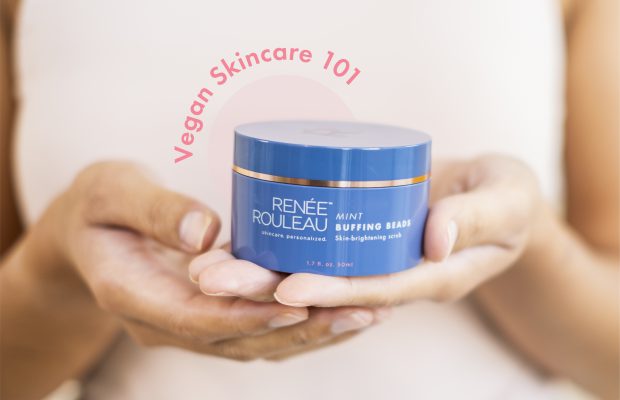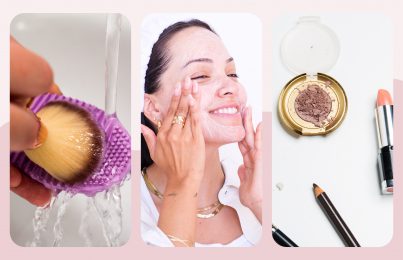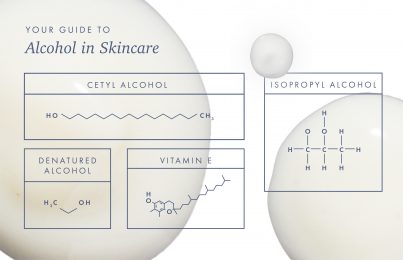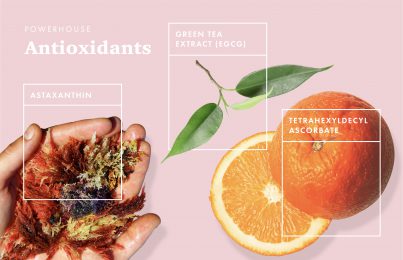From time to time, people ask me to share my thoughts on vegan skincare. They wonder what it really means for a product to be vegan, whether it’s any better or “safer” to exclusively use vegan products, and if my line is considered vegan. In this post, I’ll provide answers to all of these questions and more. Keep reading for my beginner’s guide to vegan skincare!
What Is Vegan Skincare?
In the strictest sense, a vegan skincare product must not contain any animal byproducts in the formulation or the processing of it. While it’s not necessarily regulated from a legal perspective, this is the definition that is clearly understood by brands and consumers, and there are certifying organizations that will tell you if a product is vegan or not.
However, there can be some nuance to that definition. For example, some people consider themselves “beegan,” meaning they avoid all animal products except for those that use ingredients sourced from bees, like beeswax, honey, or propolis. Their reasoning is that sourcing these bee by-products doesn’t cause any harm to the bees. This is a personal choice made by some people within the vegan community, but generally speaking, bee by-products aren’t considered to be vegan by brands and certifying organizations.
Other companies will claim to be vegan even if they’re using products from animals where the animal was not harmed to create or source the product. Some examples would be keratin from sheep, coloring from beetle extracts, and hydrolyzed milk protein from cow’s milk.
Is Vegan Skincare Regulated?
Not necessarily. A brand doesn’t need a certification to claim its products are vegan. That said, it’s a fairly standard process to do so, and that’s for a couple of reasons. The first is that it allows for transparency and review of the products. If a brand doesn’t know the source of its materials or it wants to ensure that they’re vegan, a certification would call for a deep dive into the supply chain (even their supplier’s supply chain) to make sure everything is in line with a vegan claim. To get a certification, a brand would have to follow the vegan definition in its strictest sense (no animal byproducts whatsoever).
The second is that third-party certifications can be helpful from a legal standpoint. Should litigation arise, a certification can help validate whether a product is really vegan or not. Basically, it helps reduce risk.
Is Vegan the Same Thing as Cruelty-Free?
No, vegan and cruelty-free aren’t the same, although sometimes the line can get blurred. While vegan means no animal ingredients were used to create the product, cruelty-free means the product wasn’t tested on animals. So, for example, cruelty-free would still allow something like beeswax to be in a product because the animals (the bees) weren’t harmed. This is an important distinction to understand, especially if you’re someone who’s only interested in using products that are truly vegan.
Are Vegan Products Safer Than Non-Vegan Products?
No, vegan products aren’t better or “safer” than non-vegan products. Many people are under the impression that they are, but this absolutely isn’t the case. The purpose of vegan products is to cater to consumers who prefer a vegan lifestyle. They’re not necessarily healthier or better for the skin or better performing. In fact, your body really can’t tell whether something is natural or synthetic, so the source of an ingredient doesn’t matter in that regard.
Unfortunately, it really comes down to marketing. Vegan brands have marketed themselves as providing products that are better and safer than others, and this simply isn’t true. Just like with clean beauty, some brands use this misconception to make consumers fearful. But remember, just because an ingredient is animal-derived, doesn’t mean it’s unhealthy or ineffective. In fact, many animal-derived ingredients have been proven to be safe and effective!
Again, it all comes down to personal preferences and lifestyle choices.
Are Vegan Products Better for the Environment?
It depends. Vegan ingredients aren’t necessarily better for the environment just because they’re vegan. It all comes down to the specific ingredient you’re talking about. Take coconut oil, for example. It’s often used to make cleansing agents. It can be grown on plantations that have lots of agricultural runoff from fertilization or even over-fertilization. This is bad for waterways and can lead to algae blooms, which can contribute to global warming. However, if you make cleansing agents from petroleum-derived ingredients, you may avoid the agricultural runoff, but it’s well-established that petroleum-derived ingredients can contribute to greenhouse gases as well.
Ingredient Scarcity
Another thing to consider is that some plant-based ingredients can lead to scarcity or endangerment. Australian sandalwood is a prime example. Sandalwood trees can be overharvested, and they take a really long time to replenish. That’s why sourcing of Australian sandalwood has nearly put them into extinction. (Laws have since been put into place to protect them and ensure regeneration, but we still have a limited supply since they can only regenerate so fast.)
Ingredient Repurposing
Something else to consider is whether a waste product can be repurposed. A good example of this is tallow-based ingredients. Tallow comes from beef, and it’s leftover from meat production. It’s used to make emulsifiers and cleansing agents, as well as oleic acid. Animals aren’t killed for tallow; it’s simply leftover from meat production, and it’s being repurposed for cosmetic use. In this way, it could be considered upcycling, because we’re using all parts of the animal, not just the parts that can be consumed.
Now you can get oleic acid from plants. However, plant-based oleic acid may come from plantations that came about from deforestation. It may require agricultural practices that lead to runoff, which causes pollution. Not only that but it must be processed and shipped to wherever it’s going around the world. That’s why, in this case, I would argue oleic acid from animals is more sustainable. Animal-based oleic acid is already available as a waste product, and it’s simply being repurposed.
The Bottom Line
I hope this shows just how complex the issue of sustainability is. You can see how hard it is to say whether vegan or non-vegan skincare is better for the environment! It really comes down to individual ingredients and the way they’re sourced and processed. There’s simply no perfect answer for this.
Common Ingredients That May Be Animal-Derived:
- Albumin
- Allantoin*
- Amino acids
- Bee pollen
- Beeswax
- Biotin
- Caprylic acid
- Carotene
- Cod liver oil
- Collagen
- Elastin
- Gelatin
- Glucose tyrosinase
- Glycerin*
- Honey
- Hyaluronic acid
- Imidazolidinyl urea
- Isopropyl myristate
- Isopropyl palmitate
- Keratin
- Lactic acid*
- Lanolin
- Lanolin alcohol
- Lecithin
- Linoleic acid*
- Oleic acid
- Panthenol*
- Polysorbate 80*
- Retinol*
- Royal jelly
- Sea whip extract
- Squalene
- Stearic acid*
- Tyrosine
- Vitamin B-12
- Xanthan gum*
*Renée Rouleau products are formulated with vegan versions. Not all versions are vegan.
Note: Many of these ingredients can be produced by plants or synthetically, so it’s important to contact the manufacturer to find out the true source. It’s also worth noting that some ingredients aren’t animal-derived themselves, yet they require animal-derived ingredients in their processing.
Are Renée Rouleau Products Vegan?
Yes, most of them are. In fact, the vast majority of the products in my line are vegan. There are only a few exceptions. Most notably, I use sea whip extract in a few products. This is an animal-derived ingredient that comes from coral. It’s beneficial for sensitive skin types since it can provide redness-reducing, irritation-soothing, and anti-inflammatory benefits. Below, see a list of all non-vegan products, along with vegan substitutions.
Non-Vegan Products
- Hydroboost Rescue Creme: This contains sea whip extract. For a vegan option, try the Sheer Moisture Lotion.
- Phytolipid Comfort Creme: This contains sea whip extract. For a vegan option, try the Glow Enhancing Creme.
- Redness Care Firming Serum: This contains sea whip extract. For a vegan option, try the Firm + Repair Overnight Serum.
- Post-Breakout Fading Gel: This contains sea whip extract. For a vegan option, try the Ultra Gentle Smoothing Serum.
- Purifying Face Wash: This contains sea whip extract. For a vegan option, try the Vitamin-Infused Cleansing Emulsion.
- Moisture Protecting Cleanser: This contains butter extract. For a vegan option, try the Vitamin-Infused Cleansing Emulsion.
- Bio Calm Repair Masque: This contains hydrolyzed glycosaminoglycans. For a vegan option, try the Rapid Response Detox Masque.
- Advanced Resurfacing Serum: This contains egg lecithin. For a vegan option, try the Pore + Wrinkle Perfecting Serum.
- Bedside Body Balm: This contains beeswax.
There you have it! I hope this post shed some light on the complex (and sometimes confusing) world of vegan skincare! At the end of the day, it’s up to you, as a consumer, to decide what’s best for you. Just know that a product doesn’t have to be vegan to be safe, sustainable, and/or effective. Personally, I think using products formulated for your specific skin type and buying from a brand you trust are most important!
Next, find out whether or not you could benefit from a skincare detox!
Celebrity Esthetician & Skincare Expert
As an esthetician trained in cosmetic chemistry, Renée Rouleau has spent 30 years researching skin, educating her audience, and building an award-winning line of products. Her hands-on experience as an esthetician and trusted skin care expert has created a real-world solution — products that are formulated for nine different types of skin so your face will get exactly what it needs to look and feel its best. Trusted by celebrities, editors, bloggers, and skincare obsessives around the globe, her vast real-world knowledge and constant research are why Marie Claire calls her “the most passionate skin practitioner we know.”



